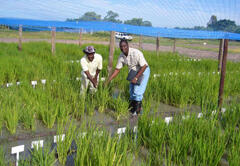Flood- and Drought-Adaptive Cropping Systems to Conserve Water Environments in Semi-arid Regions
Principal Investigator
ODA Recipient Country
Republic of Namibia
Research Institutions in Japan
Kinki University / Ryukoku University / The University of Shiga Prefecture (USP) / Nagoya University / Tohoku University
Research Institutions in Counterpart Country
University of Namibia (UNAM)
Adoption fiscal year
FY 2011
Research Period
5 Years
Overview of the Research Project
Agriculture that supplies a constant yield in years with flooding and droughts
Many areas of southern Africa suffer from food shortages as a result of flooding and drought. The instability of seasonal wetlands that is formed during the rainy season is forcing the desert nation of Namibia to redesign its agriculture to ensure sufficient food supplies. The aim of this project is to develop new agricultural techniques that supply a constant yield even in years of flooding and drought. Specifically, rice, a newly introduced crop, is being grown with pearl millet, the local staple, to assess water requirements and economic feasibility, and develop a new cultivation model.
Analyzing data on water, farming, and wetlands to introduce a new cultivation model
We are investigating appropriate mixed cropping combinations and arrangements to ensure economic water use. By investigating wetland water quantity and the degree of dependence of crop growth on flooding, we aim to establish and introduce a new sustainable cultivation model in southern Africa that both protects the aquatic environment and makes maximum use of seasonal wetlands to help raise the living standards of subsistence farmers.
Photo gallery

Rice grown and harvested at the University of Namibia ( left ) and pearl millet grown by local farmers ( right ). We are developing a new cultivation method that ensures stable yields of both crops.
Research Project Web site
Press Release
Links
Projects
Contact Us
Japan Science and Technology Agency (JST)
Department of International Affairs
SATREPS Group
TEL : +81-3-5214-8085
Related articles by Category
- Bioresources
Bioresources

 Republic of Indonesia
Republic of Indonesia
Promoting the blue economy by utilizing seaweed resources!
Development of Sustainable Seaweed Based Functional Products for Promoting Blue Economy
- Africa
Environment / Energy
(Global-scale environmental issues)
 Republic of Zambia
Republic of Zambia
Experienced, not taught - Realizing safe water, sanitation and hygiene in Africa
Risk-based Participatory WASH Planning and Citizen-data WASH Statistics for African Peri-urban Settlements
- SDGs : Goal.2
Bioresources

 Republic of Indonesia
Republic of Indonesia
Achieve sustainable vegetable production in tropical regions using advanced breeding technology!
Breeding Innovation in Chili Pepper and Tomato to Accelerate Sustainable Vegetable Production in Tropical Regions






 Republic of Namibia
Republic of Namibia














